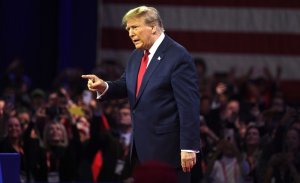March 4 (UPI) — The U.S. Supreme Court ruled unanimously Monday that former President Donald Trump can appear on the ballot, reversing a ruling by the Colorado Supreme Court.
The ruling will likely quash efforts to block Trump from the ballot across the country.
The majority opinion is that the role of disqualifying a presidential candidate belongs to Congress.
“Permitting state enforcement of Section 3 against federal officeholders and candidates would raise serious questions about the scope of that power,” the majority opinion reads.
The case came before the high court after the Colorado Supreme Court ruled that Trump is ineligible to appear on the state’s ballot. It ruled 4 to 3 that Trump engaged in insurrection, disqualifying him under Section 3 of the 14th Amendment to the U.S. Constitution.
Colorado Secretary of State Jena Griswold reacted to the decision on X.
“I am disappointed in the U.S. Supreme Court’s decision stripping states of the authority to enforce Section 3 of the 14th Amendment for federal candidates,” Griswold tweeted. “Colorado should be able to bar oath-breaking insurrections from our ballot.”
The U.S. Supreme Court held a hearing on the case last month.
Section 3 bars anyone who participated in or aided in an insurrection from holding office. It was used to block members of the Confederacy from holding office after the Civil War.
Conservative Justice Amy Coney Barrett broke from the majority opinion slightly, penning her own opinion. She agrees that states “lack the power to enforce Section 3 against presidential candidates.” However, she declined to join the majority in saying the power to disqualify lies solely with Congress.
“In my judgment, this is not the time to amplify disagreement with stridency,” she wrote. “The court has settled a politically charged issue in the volatile season of a presidential election. Particularly in this circumstance, writings on the court should turn the national temperature down, not up.”
The opinion of liberal Justices Sonia Sotomayor, Elena Kagan and Ketanji Brown Jackson fell in line with Coney Barrett’s. They agreed with the majority, writing that allowing Colorado to disqualify Trump would “create a chaotic state-by-state patchwork.” Like Coney Barrett, they say that is enough to resolve the case.
“Although only an individual state’s action is at issue here, the majority opines on which federal actors can enforce Section 3, and how they must do so,” the opinion of Sotomayor, Kagan and Brown Jackson reads. “In doing so, the majority shuts the door on other potential means of federal enforcement. We cannot join an opinion that decides momentous and difficult issues unnecessarily.”
Notably, the nine justices did not directly stake an opinion on Colorado’s ruling that Trump engaged in an insurrection.
The case was brought to the Colorado court system by a group of six Republican and unaffiliated voters. They were represented by Citizens for Responsibility and Ethics in Washington.
A lower court judge in Colorado ruled that it would not block Trump from the ballot, while also finding that he did engage in insurrection and incited the riot at the U.S. Capitol on Jan. 6, 2021.
Trump’s defense team argued that because the language of Section 3 does not include the office of president among those listed, it does not apply to the presidency. It also refuted states’ ability to disqualify presidential candidates, arguing that only Congress has this power.
The defense also objected to the ruling that he engaged in insurrection.
Colorado is one of several states to hear arguments over Trump’s ballot eligibility. A Michigan appeals court ruled he can remain on the ballot, while the Minnesota Supreme Court dismissed a lawsuit seeking to block him.
Illinois and Massachusetts dismissed lawsuits against Trump and the Maine Judicial Supreme Court rejected an appeal to remove him.
On Monday, following the Supreme Court ruling, Maine Secretary of State Shenna Bellows removed her objection to Trump appearing on the state’s ballot.
“Consistent with my oath and obligation to follow the law and the Constitution, and pursuant to the Anderson decision, I hereby withdraw my determination that Mr. Trump’s primary petition is invalid,” she said in a statement.
However, a circuit court judge in Illinois ordered the state board of elections to remove Trump from the primary ballot last week.
The Illinois Republican primary will be held on March 19.
Under Section 3, Congress can grant a person amnesty, removing their disqualification, by a two-thirds vote by the House and Senate.

COMMENTS
Please let us know if you're having issues with commenting.